- Home
- Edith Wharton
Bunner Sisters Page 8
Bunner Sisters Read online
Page 8
So the summer wore on. Ann Eliza was conscious that Mrs. Hawkins and Miss Mellins were watching her with affectionate anxiety, but the knowledge brought no comfort. She no longer cared what they felt or thought about her. Her grief lay far beyond touch of human healing, and after a while she became aware that they knew they could not help her. They still came in as often as their busy lives permitted, but their visits grew shorter, and Mrs. Hawkins always brought Arthur or the baby, so that there should be something to talk about, and some one whom she could scold.
The autumn came, and the winter. Business had fallen off again, and but few purchasers came to the little shop in the basement. In January Ann Eliza pawned her mother's cashmere scarf, her mosaic brooch, and the rosewood what-not on which the clock had always stood; she would have sold the bedstead too, but for the persistent vision of Evelina returning weak and weary, and not knowing where to lay her head.
The winter passed in its turn, and March reappeared with its galaxies of yellow jonquils at the windy street corners, reminding Ann Eliza of the spring day when Evelina had come home with a bunch of jonquils in her hand. In spite of the flowers which lent such a premature brightness to the streets the month was fierce and stormy, and Ann Eliza could get no warmth into her bones. Nevertheless, she was insensibly beginning to take up the healing routine of life. Little by little she had grown used to being alone, she had begun to take a languid interest in the one or two new purchasers the season had brought, and though the thought of Evelina was as poignant as ever, it was less persistently in the foreground of her mind.
Late one afternoon she was sitting behind the counter, wrapped in her shawl, and wondering how soon she might draw down the blinds and retreat into the comparative cosiness of the back room. She was not thinking of anything in particular, except perhaps in a hazy way of the lady with the puffed sleeves, who after her long eclipse had reappeared the day before in sleeves of a new cut, and bought some tape and needles. The lady still wore mourning, but she was evidently lightening it, and Ann Eliza saw in this the hope of future orders. The lady had left the shop about an hour before, walking away with her graceful step toward Fifth Avenue. She had wished Ann Eliza good day in her usual affable way, and Ann Eliza thought how odd it was that they should have been acquainted so long, and yet that she should not know the lady's name. From this consideration her mind wandered to the cut of the lady's new sleeves, and she was vexed with herself for not having noted it more carefully. She felt Miss Mellins might have liked to know about it. Ann Eliza's powers of observation had never been as keen as Evelina's, when the latter was not too self-absorbed to exert them. As Miss Mellins always said, Evelina could "take patterns with her eyes": she could have cut that new sleeve out of a folded newspaper in a trice! Musing on these things, Ann Eliza wished the lady would come back and give her another look at the sleeve. It was not unlikely that she might pass that way, for she certainly lived in or about the Square. Suddenly Ann Eliza remarked a small neat handkerchief on the counter: it must have dropped from the lady's purse, and she would probably come back to get it. Ann Eliza, pleased at the idea, sat on behind the counter and watched the darkening street. She always lit the gas as late as possible, keeping the box of matches at her elbow, so that if any one came she could apply a quick flame to the gas-jet. At length through the deepening dusk she distinguished a slim dark figure coming down the steps to the shop. With a little warmth of pleasure about her heart she reached up to light the gas. "I do believe I'll ask her name this time," she thought. She raised the flame to its full height, and saw her sister standing in the door.
There she was at last, the poor pale shade of Evelina, her thin face blanched of its faint pink, the stiff ripples gone from her hair, and a mantle shabbier than Ann Eliza's drawn about her narrow shoulders. The glare of the gas beat full on her as she stood and looked at Ann Eliza.
"Sister--oh, Evelina! I knowed you'd come!"
Ann Eliza had caught her close with a long moan of triumph. Vague words poured from her as she laid her cheek against Evelina's--trivial inarticulate endearments caught from Mrs. Hawkins's long discourses to her baby.
For a while Evelina let herself be passively held; then she drew back from her sister's clasp and looked about the shop. "I'm dead tired. Ain't there any fire?" she asked.
"Of course there is!" Ann Eliza, holding her hand fast, drew her into the back room. She did not want to ask any questions yet: she simply wanted to feel the emptiness of the room brimmed full again by the one presence that was warmth and light to her.
She knelt down before the grate, scraped some bits of coal and kindling from the bottom of the coal-scuttle, and drew one of the rocking-chairs up to the weak flame. "There--that'll blaze up in a minute," she said. She pressed Evelina down on the faded cushions of the rocking-chair, and, kneeling beside her, began to rub her hands.
"You're stone-cold, ain't you? Just sit still and warm yourself while I run and get the kettle. I've got something you always used to fancy for supper." She laid her hand on Evelina's shoulder. "Don't talk--oh, don't talk yet!" she implored. She wanted to keep that one frail second of happiness between herself and what she knew must come.
Evelina, without a word, bent over the fire, stretching her thin hands to the blaze and watching Ann Eliza fill the kettle and set the supper table. Her gaze had the dreamy fixity of a half- awakened child's.
Ann Eliza, with a smile of triumph, brought a slice of custard pie from the cupboard and put it by her sister's plate.
"You do like that, don't you? Miss Mellins sent it down to me this morning. She had her aunt from Brooklyn to dinner. Ain't it funny it just so happened?"
"I ain't hungry," said Evelina, rising to approach the table.
She sat down in her usual place, looked about her with the same wondering stare, and then, as of old, poured herself out the first cup of tea.
"Where's the what-not gone to?" she suddenly asked.
Ann Eliza set down the teapot and rose to get a spoon from the cupboard. With her back to the room she said: "The what-not? Why, you see, dearie, living here all alone by myself it only made one more thing to dust; so I sold it."
Evelina's eyes were still travelling about the familiar room. Though it was against all the traditions of the Bunner family to sell any household possession, she showed no surprise at her sister's answer.
"And the clock? The clock's gone too."
"Oh, I gave that away--I gave it to Mrs. Hawkins. She's kep' awake so nights with that last baby."
"I wish you'd never bought it," said Evelina harshly.
Ann Eliza's heart grew faint with fear. Without answering, she crossed over to her sister's seat and poured her out a second cup of tea. Then another thought struck her, and she went back to the cupboard and took out the cordial. In Evelina's absence considerable draughts had been drawn from it by invalid neighbours; but a glassful of the precious liquid still remained.
"Here, drink this right off--it'll warm you up quicker than anything," Ann Eliza said.
Evelina obeyed, and a slight spark of colour came into her cheeks. She turned to the custard pie and began to eat with a silent voracity distressing to watch. She did not even look to see what was left for Ann Eliza.
"I ain't hungry," she said at last as she laid down her fork. "I'm only so dead tired--that's the trouble."
"then you'd better get right into bed. Here's my old plaid dressing-gown--you remember it, don't you?" Ann Eliza laughed, recalling Evelina's ironies on the subject of the antiquated garment. With trembling fingers she began to undo her sister's cloak. The dress beneath it told a tale of poverty that Ann Eliza dared not pause to note. She drew it gently off, and as it slipped from Evelina's shoulders it revealed a tiny black bag hanging on a ribbon about her neck. Evelina lifted her hand as though to screen the bag from Ann Eliza; and the elder sister, seeing the gesture, continued her task with lowered eyes. She undressed Evelina as quickly as she could, and wrapping her in the plaid dressing-gown put
her to bed, and spread her own shawl and her sister's cloak above the blanket.
"Where's the old red comfortable?" Evelina asked, as she sank down on the pillow.
"The comfortable? Oh, it was so hot and heavy I never used it after you went--so I sold that too. I never could sleep under much clothes."
She became aware that her sister was looking at her more attentively.
"I guess you've been in trouble too," Evelina said.
"Me? In trouble? What do you mean, Evelina?"
"You've had to pawn the things, I suppose," Evelina continued in a weary unmoved tone. "Well, I've been through worse than that. I've been to hell and back."
"Oh, Evelina--don't say it, sister!" Ann Eliza implored, shrinking from the unholy word. She knelt down and began to rub her sister's feet beneath the bedclothes.
"I've been to hell and back--if I am back," Evelina repeated. She lifted her head from the pillow and began to talk with a sudden feverish volubility. "It began right away, less than a month after we were married. I've been in hell all that time, Ann Eliza." She fixed her eyes with passionate intentness on Ann Eliza's face. "He took opium. I didn't find it out till long afterward--at first, when he acted so strange, I thought he drank. But it was worse, much worse than drinking."
"Oh, sister, don't say it--don't say it yet! It's so sweet just to have you here with me again."
"I must say it," Evelina insisted, her flushed face burning with a kind of bitter cruelty. "You don't know what life's like-- you don't know anything about it--setting here safe all the while in this peaceful place."
"Oh, Evelina--why didn't you write and send for me if it was like that?"
"That's why I couldn't write. Didn't you guess I was ashamed?"
"How could you be? Ashamed to write to Ann Eliza?"
Evelina raised herself on her thin elbow, while Ann Eliza, bending over, drew a corner of the shawl about her shoulder.
"Do lay down again. You'll catch your death."
"My death? That don't frighten me! You don't know what I've been through." And sitting upright in the old mahogany bed, with flushed cheeks and chattering teeth, and Ann Eliza's trembling arm clasping the shawl about her neck, Evelina poured out her story. It was a tale of misery and humiliation so remote from the elder sister's innocent experiences that much of it was hardly intelligible to her. Evelina's dreadful familiarity with it all, her fluency about things which Ann Eliza half-guessed and quickly shuddered back from, seemed even more alien and terrible than the actual tale she told. It was one thing--and heaven knew it was bad enough!--to learn that one's sister's husband was a drug-fiend; it was another, and much worse thing, to learn from that sister's pallid lips what vileness lay behind the word.
Evelina, unconscious of any distress but her own, sat upright, shivering in Ann Eliza's hold, while she piled up, detail by detail, her dreary narrative.
"The minute we got out there, and he found the job wasn't as good as he expected, he changed. At first I thought he was sick--I used to try to keep him home and nurse him. Then I saw it was something different. He used to go off for hours at a time, and when he came back his eyes kinder had a fog over them. Sometimes he didn't har'ly know me, and when he did he seemed to hate me. Once he hit me here." She touched her breast. "Do you remember, Ann Eliza, that time he didn't come to see us for a week--the time after we all went to Central Park together--and you and I thought he must be sick?"
Ann Eliza nodded.
"Well, that was the trouble--he'd been at it then. But nothing like as bad. After we'd been out there about a month he disappeared for a whole week. They took him back at the store, and gave him another chance; but the second time they discharged him, and he drifted round for ever so long before he could get another job. We spent all our money and had to move to a cheaper place. Then he got something to do, but they hardly paid him anything, and he didn't stay there long. When he found out about the baby--"
"The baby?" Ann Eliza faltered.
"It's dead--it only lived a day. When he found out about it, he got mad, and said he hadn't any money to pay doctors' bills, and I'd better write to you to help us. He had an idea you had money hidden away that I didn't know about." She turned to her sister with remorseful eyes. "It was him that made me get that hundred dollars out of you."
"Hush, hush. I always meant it for you anyhow."
"Yes, but I wouldn't have taken it if he hadn't been at me the whole time. He used to make me do just what he wanted. Well, when I said I wouldn't write to you for more money he said I'd better try and earn some myself. That was when he struck me. . . . Oh, you don't know what I'm talking about yet! . . . I tried to get work at a milliner's, but I was so sick I couldn't stay. I was sick all the time. I wisht I'd ha' died, Ann Eliza."
"No, no, Evelina."
"Yes, I do. It kept getting worse and worse. We pawned the furniture, and they turned us out because we couldn't pay the rent; and so then we went to board with Mrs. Hochmuller."
Ann Eliza pressed her closer to dissemble her own tremor. "Mrs. Hochmuller?"
"Didn't you know she was out there? She moved out a month after we did. She wasn't bad to me, and I think she tried to keep him straight--but Linda--"
"Linda--?"
"Well, when I kep' getting worse, and he was always off, for days at a time, the doctor had me sent to a hospital."
"A hospital? Sister--sister!"
"It was better than being with him; and the doctors were real kind to me. After the baby was born I was very sick and had to stay there a good while. And one day when I was laying there Mrs. Hochmuller came in as white as a sheet, and told me him and Linda had gone off together and taken all her money. That's the last I ever saw of him." She broke off with a laugh and began to cough again.
Ann Eliza tried to persuade her to lie down and sleep, but the rest of her story had to be told before she could be soothed into consent. After the news of Ramy's flight she had had brain fever, and had been sent to another hospital where she stayed a long time--how long she couldn't remember. Dates and days meant nothing to her in the shapeless ruin of her life. When she left the hospital she found that Mrs. Hochmuller had gone too. She was penniless, and had no one to turn to. A lady visitor at the hospital was kind, and found her a place where she did housework; but she was so weak they couldn't keep her. Then she got a job as waitress in a down-town lunch-room, but one day she fainted while she was handing a dish, and that evening when they paid her they told her she needn't come again.
"After that I begged in the streets"--(Ann Eliza's grasp again grew tight)--"and one afternoon last week, when the matinees was coming out, I met a man with a pleasant face, something like Mr. Hawkins, and he stopped and asked me what the trouble was. I told him if he'd give me five dollars I'd have money enough to buy a ticket back to New York, and he took a good look at me and said, well, if that was what I wanted he'd go straight to the station with me and give me the five dollars there. So he did--and he bought the ticket, and put me in the cars."
Evelina sank back, her face a sallow wedge in the white cleft of the pillow. Ann Eliza leaned over her, and for a long time they held each other without speaking.
They were still clasped in this dumb embrace when there was a step in the shop and Ann Eliza, starting up, saw Miss Mellins in the doorway.
"My sakes, Miss Bunner! What in the land are you doing? Miss Evelina--Mrs. Ramy--it ain't you?"
Miss Mellins's eyes, bursting from their sockets, sprang from Evelina's pallid face to the disordered supper table and the heap of worn clothes on the floor; then they turned back to Ann Eliza, who had placed herself on the defensive between her sister and the dress-maker.
"My sister Evelina has come back--come back on a visit. she was taken sick in the cars on the way home--I guess she caught cold--so I made her go right to bed as soon as ever she got here."
Ann Eliza was surprised at the strength and steadiness of her voice. Fortified by its sound she went on, her eyes on Miss Mellins's baff
led countenance: "Mr. Ramy has gone west on a trip--a trip connected with his business; and Evelina is going to stay with me till he comes back."
XII
WHAT measure of belief her explanation of Evelina's return obtained in the small circle of her friends Ann Eliza did not pause to enquire. Though she could not remember ever having told a lie before, she adhered with rigid tenacity to the consequences of her first lapse from truth, and fortified her original statement with additional details whenever a questioner sought to take her unawares.
But other and more serious burdens lay on her startled conscience. For the first time in her life she dimly faced the awful problem of the inutility of self-sacrifice. Hitherto she had never thought of questioning the inherited principles which had guided her life. Self-effacement for the good of others had always seemed to her both natural and necessary; but then she had taken it for granted that it implied the securing of that good. Now she perceived that to refuse the gifts of life does not ensure their transmission to those for whom they have been surrendered; and her familiar heaven was unpeopled. She felt she could no longer trust in the goodness of God, and there was only a black abyss above the roof of Bunner Sisters.

 The Age of Innocence
The Age of Innocence The Reef
The Reef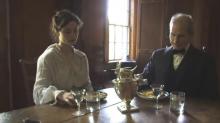 Summer
Summer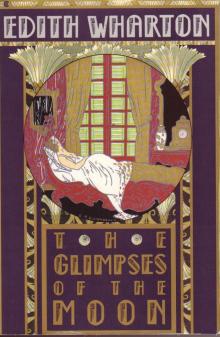 The Glimpses of the Moon
The Glimpses of the Moon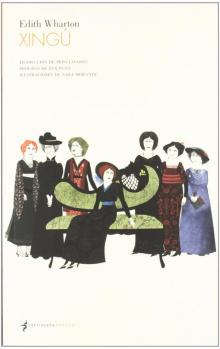 Xingu
Xingu The Fruit of the Tree
The Fruit of the Tree Fast and Loose
Fast and Loose Artemis to Actaeon and Other Verse
Artemis to Actaeon and Other Verse The Line of Least Resistance
The Line of Least Resistance The Lamp of Psyche
The Lamp of Psyche The Reckoning
The Reckoning Afterward
Afterward The New York Stories of Edith Wharton
The New York Stories of Edith Wharton The 2014 Halloween Horrors Megapack
The 2014 Halloween Horrors Megapack 'Copy': A Dialogue
'Copy': A Dialogue The Recovery
The Recovery The Fulness of Life
The Fulness of Life Early Short Stories Vol. 1
Early Short Stories Vol. 1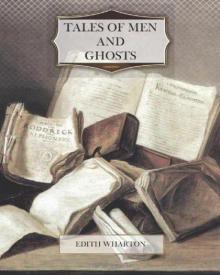 Tales of Men and Ghosts
Tales of Men and Ghosts The House of the Dead Hand
The House of the Dead Hand That Good May Come
That Good May Come The Buccaneers
The Buccaneers Other Times, Other Manners
Other Times, Other Manners The Hermit and the Wild Woman
The Hermit and the Wild Woman Kerfol
Kerfol The Duchess at Prayer
The Duchess at Prayer Bunner Sisters
Bunner Sisters The Choice
The Choice Madame De Treymes
Madame De Treymes Ethan Frome, Summer, Bunner Sisters
Ethan Frome, Summer, Bunner Sisters In Morocco
In Morocco The Valley of Decision
The Valley of Decision Age of Innocence (Barnes & Noble Classics Series)
Age of Innocence (Barnes & Noble Classics Series) The Angel at the Grave
The Angel at the Grave April Showers
April Showers Sanctuary
Sanctuary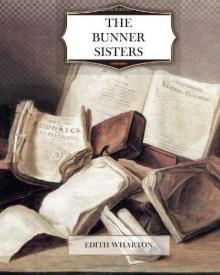 The Bunner Sisters
The Bunner Sisters Mrs. Manstey's View
Mrs. Manstey's View Writing a War Story
Writing a War Story The Custom of the Country
The Custom of the Country In Trust
In Trust The Triumph of the Night
The Triumph of the Night The Hermit and the Wild Woman, and Other Stories
The Hermit and the Wild Woman, and Other Stories Roman Fever and Other Stories
Roman Fever and Other Stories The Mission of Jane
The Mission of Jane The Descent of Man and Other Stories
The Descent of Man and Other Stories Coming Home
Coming Home The Touchstone
The Touchstone Early Short Stories Vol. 2
Early Short Stories Vol. 2 Edith Wharton's Verse, 1879-1919, from various journals.
Edith Wharton's Verse, 1879-1919, from various journals.